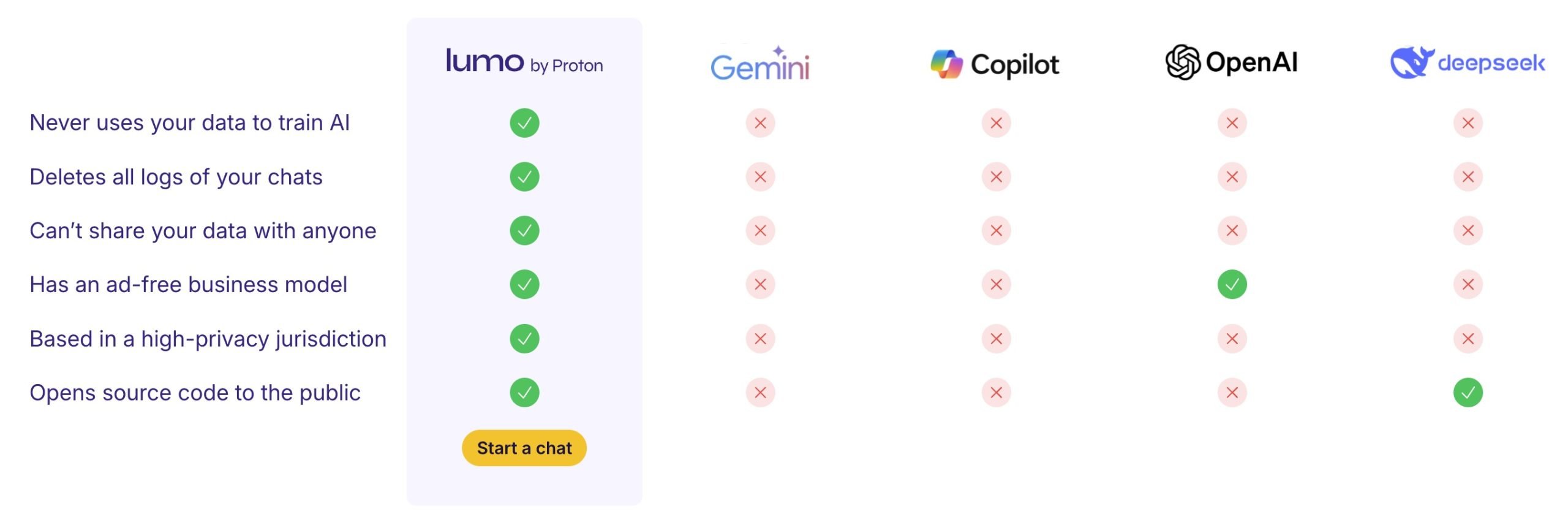If you’re tired of censorship and dystopian threats against civil liberties, subscribe to Reclaim The Net.
Proton has introduced Lumo, a new AI assistant crafted with a strong focus on safeguarding user privacy. Unlike most AI tools on the market, Lumo was developed without relying on external partners or harvesting user data for training purposes.
Accessible through browsers and mobile apps for Android and iOS, Lumo requires no account to begin using it.
Users can upload documents for analysis or, if they have a Proton Drive account, link it to the assistant for secure access to cloud-stored files.
One of Lumo’s central features is its commitment to discretion. It stores no chat logs by default and offers a ghost mode that deletes conversations as soon as the session ends.
For users who choose to keep their history, Proton applies zero-access encryption, a method already used in its other services, ensuring that only the user can decrypt their stored conversations locally.

Proton emphasized that Lumo is built entirely on open-source language models. The company stated it will continue to base its research and development on these models alone and will never use user input for training. Hosting operations are limited to Proton’s European data centers, which the company says gives it a privacy edge over offerings from companies headquartered in the United States or China.
“Lumo is based upon open-source language models and operates from Proton’s European datacenters. This gives you much greater transparency into the way Lumo works than any other major AI assistant. Unlike Apple Intelligence and others, Lumo is not a partnership with OpenAI or other American or Chinese AI companies, and your queries are never sent to any third parties,” Proton said in its blog post.
Lumo draws on a range of open-source large language models hosted on Proton’s European servers. Among the models powering the assistant are Mistral’s Nemo, Mistral Small 3, Nvidia’s OpenHands 32B, and OLMO 2 32B from the Allen Institute for AI. The system dynamically routes each request to the model most capable of handling the specific task, selecting based on the strengths of each model in different scenarios.
A new wave of cloud-based AI tools is emerging from companies better known for championing user privacy, offering alternatives to mainstream services that often come with extensive data collection practices.
Among them is Brave Leo, built directly into the Brave browser. Leo offers users a convenient, integrated AI assistant while maintaining strong privacy protections: queries are anonymized, not recorded, and never used to train underlying models. Users don’t even need to create an account to use it.
Duck AI, developed by DuckDuckGo, takes a similarly cautious approach. Integrated into its private search engine, the chat tool anonymizes all interactions and strips IP addresses from requests.
It also clearly discloses which model is being used for a given session.
Meanwhile, Venice positions itself as a privacy-aware AI platform that supports multiple open-source models, allowing users to chat, write, and code without the usual trade-offs in data control.
If you’re tired of censorship and dystopian threats against civil liberties, subscribe to Reclaim The Net.
The post Proton Launches Lumo, a Privacy-First AI Assistant appeared first on Reclaim The Net.
Click this link for the original source of this article.
Author: Rick Findlay
This content is courtesy of, and owned and copyrighted by, https://reclaimthenet.org and its author. This content is made available by use of the public RSS feed offered by the host site and is used for educational purposes only. If you are the author or represent the host site and would like this content removed now and in the future, please contact USSANews.com using the email address in the Contact page found in the website menu.





